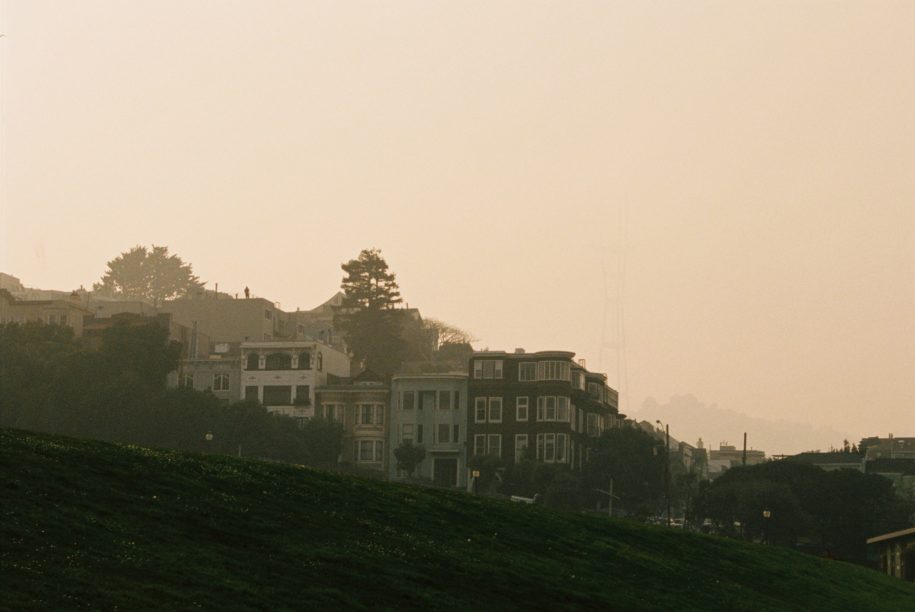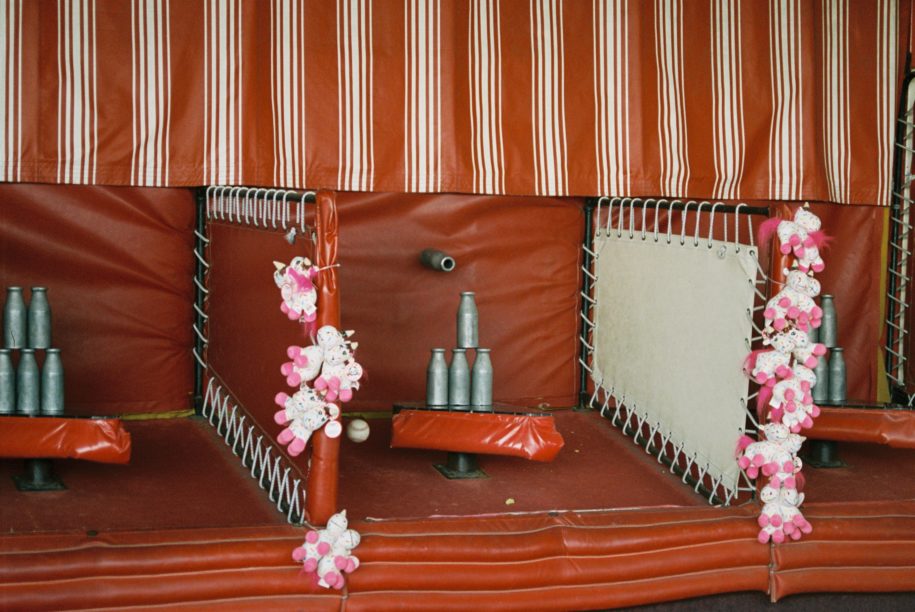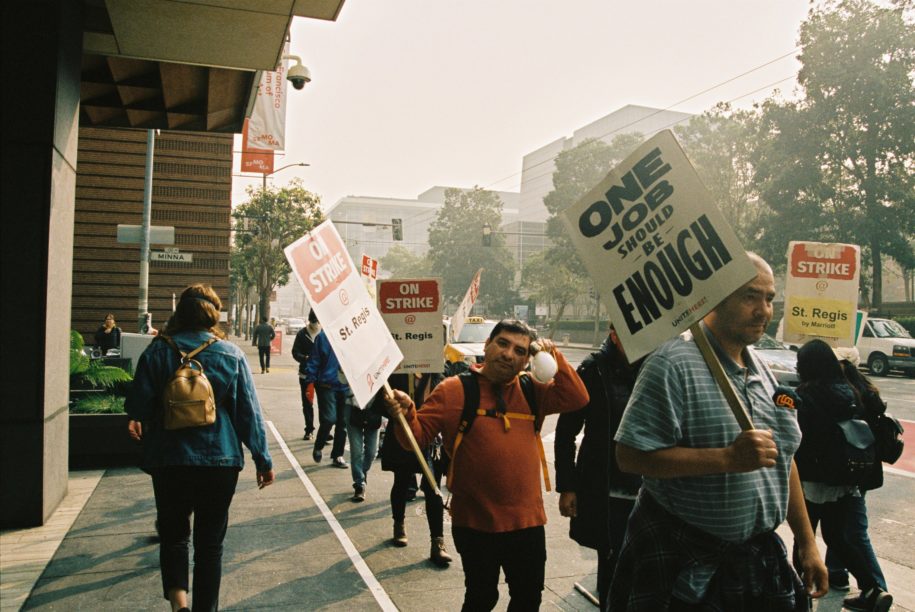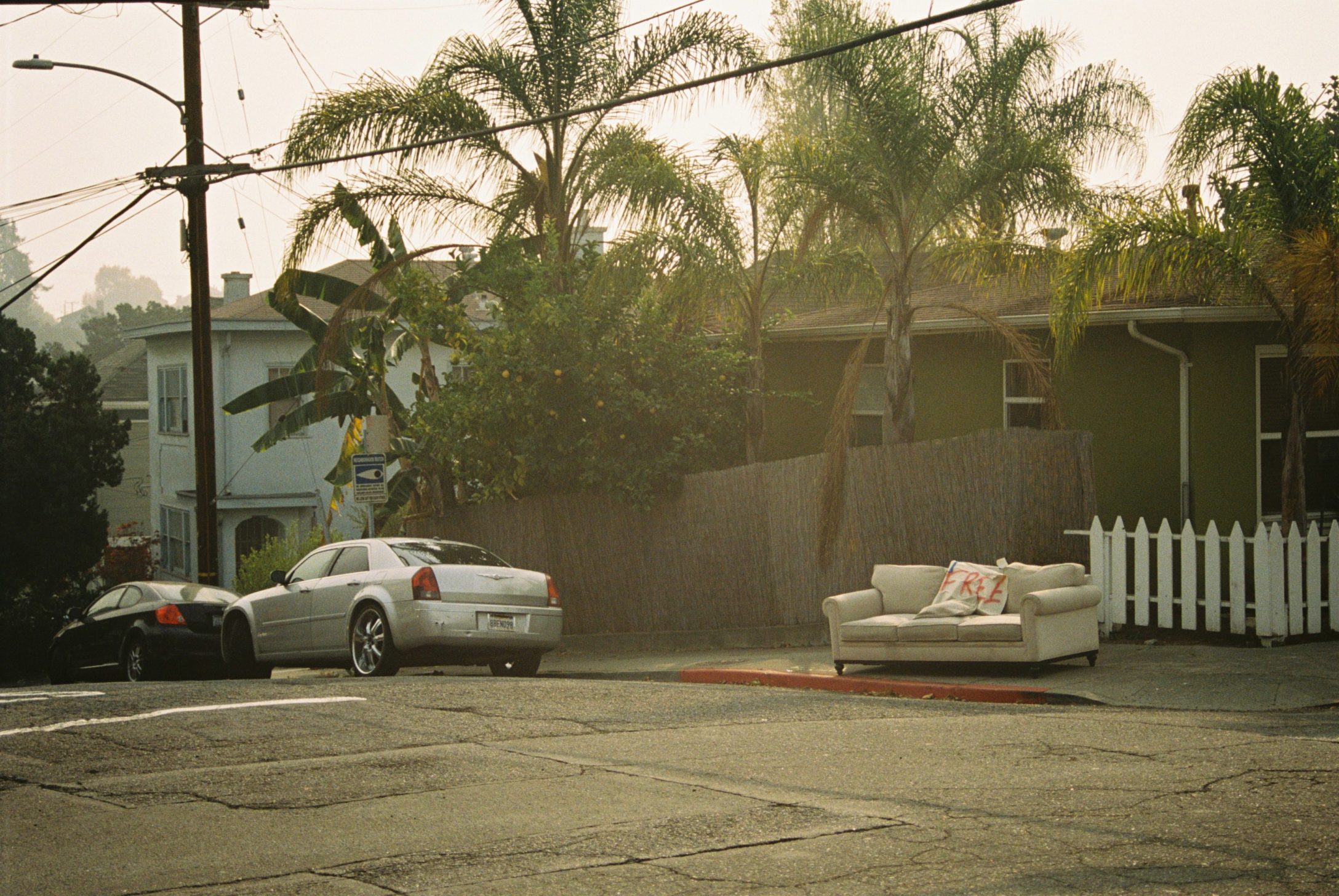Flying over Reno, we realized something was wrong. A haze had settled over the mountains, leaving only the tips of peaks visible from the window. I hadn’t been paying enough attention to the fires. Rachel and I had been moving house in Dublin that week, and I had only a vague sense of how bad things were. The approach to SFO is straight over water; the runway appears a second or two before touchdown. Through this dark air it was pure faith. The largest and deadliest forest fires in California’s history were burning up north. They would kill more than 80 people before they were contained, wiping the town of Paradise nearly from existence. The smoke, from wood, from plastic, from God knows what, lay over the city for a few days.
Rachel is an Arizonan, and hadn’t seen her family in a year. There’s no direct flight to Phoenix so we thought we’d put a few days in between the connection, and I would show her the place I used to live before we met. She had never visited, and I awkwardly showed her around one of her own country’s cities, trying not to make broad generalisations about somewhere that was not my own. I was last in the Bay Area in 2014 during the driest period on record, an eye-watering drought you could feel and smell. I took a year-long visa after graduation that I hoped would make me more employable back home. It was a strange time in the US, a period of relative quiet in high politics: an aging presidency with a hostile congress achieving nothing but the usual bipartisan goals of continuing wars that did not register in the US much. Donald Trump had yet to declare as a candidate, and I had confidently predicted on several occasions that he would never run, and certainly never win.
We stayed with a friend in Oakland, the only person I was still in touch with. We had worked together at the worst kind of NGO. The brief was LGBT employment rights, but it functioned mainly as a pinkwashing enterprise for the world’s worst corporations. We hosted elaborate galas where we handed out awards with names like ‘Trailblazer” and “Champion” top-level executives from petrochemical giants, hedge funds, media monopolies and the financial services groups who had brought the world economy to the edge of destruction and defrauded millions in the aftermath. At our exhibition hall during the marquee event of the year there were stands from the NSA, the CIA and most of the world’s manufacturers of nuclear weapons. The place was also plagued by bad work practices, unfair dismissals and outstanding harassment cases. As a 23 year-old intern, I was harassed by both a direct superior and a member of the board of directors in my six months of work. I was kept on a series of short term contracts. The terms of my visa allowed exactly thirty days to elapse between jobs before I would be required to leave the country. My friend Emily was a salvage from the wreckage.
As a teenager my dreams of California were shaped by cultural exports like the OC, a glossy teen drama that everyone in the suburbs of Dublin seemed obsessed with, myself included, or a comedy website and forum called Something Awful that briefly ruled the internet in the early to mid ‘00s. It’s seldom mentioned today but SA was a breeding ground for much of the currents of online culture still with us, from a coltish Anglophone left to the sort of nihilistic misogyny and nativism that would congeal into the alt-right. From here spawned 4Chan, but also a slew of left and liberal writers and organisers. Its chief appeal was a $10 dollar entrance fee, which theoretically improved the quality of the discourse as banning and rebuying was a constant threat. Free speech costs ten bucks was the unofficial motto. Aside from the politics and trolling forums, there were dozens of specialised sections, the most celebrated of which was Comedy Goldmine. From here the best stories were pulled and collated into a weekly feature that went up on the main site. They were mostly US-centric, and seemed heavily west coast. This suburban world was much like my own, the same boring and degrading part time jobs, the same bad beer and worse weed, the same romantic misadventures and aching loneliness. But here it was foreign, exotic. You might be delivering pizzas during the week but you could drive out to the Pacific Ocean on the weekend. And when you were there it wouldn’t rain on you, you wouldn’t have to set little petrol fires trying to keep yourself warm while you drank cans of Polish lager in a patch of wasteland.

According to the EPA, an air quality score of 1-50 is “good,” 51-100 is “moderate,” 101-150 is “unhealthy for sensitive groups,” 151-200 is “unhealthy,” 201-300 is “very unhealthy.” Where I was staying, it was 278. Visibility was low, and people exchanged memes comparing the skyline to Blade Runner 2049 and Mad Max Fury Road. The Museum of Modern Art, newly opened since my last time, had a few collections free during the crisis. It still cost $25 to go to the upper floors. We pulled off our masks and breathed air heavily scrubbed for the sake of the Picassos. Outside the hotels of the city, Marriott workers from Unite Here Local 2 were striking through the foul air, carrying signs saying One Job Should Be Enough. Marriott had been a proud supporter of our old NGO. In December thousands of these workers won $4 an hour pay increases and better safeguards against sexual harassment.
We sat in a deserted Dolores Park and I tried to describe to my girlfriend what it looked like when it was full of people. We left when we started to feel the scraping inside our lungs through the masks. Those masks only last a few days, and everywhere had long sold out. On the BART back across the bay I saw a banner for East Bay DSA, a socialist group who handed out more masks during the crisis than the city government did.
We drove down to Santa Cruz, where the pollution map registered only moderate danger. Here the sun was
At a stand on the Santa Cruz boardwalk we shot metal pellets at a red star printed on a piece of cheap paper. If you got all the red off, you won a prize. It looked so simple and yet no one ever succeeded. There was always a little piece still attached.

California was where I played out my first real practices of adulthood. It’s where I had my first serious, career-type job and first proper relationship, with the hard, important choices of visas and commitments. It resembled my teenage imaginations in sharp and fuzzy ways. It was a place where I imagined I was doing some good, and became disillusioned when I realised I was not. I was back and it was the same, but different, refracted again through the lens of disaster. I walked Rachel through my old neighbourhood, down Polk Street, the long up and down path from the Marina through Russian Hill, to Nob Hill and the Tenderloin beyond. We passed the coffee shop that took Bitcoin and the hospital where I ran up thousands of dollars of debt after shattering my collarbone. We paused for a second at the Vietnamese breakfast place where two women offered to cut up my food the week after.
We sat in a Rockridge cafe the morning before our flight to Phoenix. I peered out the window and wondered whether the smoke wasn’t clearing a little. The tables were narrow and close and I could hear a man with a soft voice beside us tell his friend he was worried about his sleep apnea machine pumping the pollution into his lungs while he slept. He didn’t know whether his COPD would be aggravated more by leaving the machine off or on. His friend didn’t know either. I wonder if he knew his CPAP machine might have been paying attention, and sending that information to his insurer in case they ever wanted to deny him coverage for it.
Stephen Macedo once wrote that liberalism “holds out the promise, or the threat, of making all the world like California”. In the early 21st century, liberalism is triumphant, inside the state of California at least. The state where Governor Reagan once won two terms, where a young boy from Yorba Linda went on to win the presidency through wholesale appeal to racial reaction, did not even have a Republican on the ballot for the 2018 Senate election. That race was little more than a contest between two varieties of liberal. In Orange County, the birthplace of the modern conservative movement, the Democratic party won every House seat. There was a certain amount of continuity between the last years of Schwarzenegger’s governorship and that of his successor, Jerry Brown. Both were fiscal conservatives who made environmentalism and reduction of carbon emissions a focus of their time. From a certain perspective in 2014, California was making decent progress on emissions. But the political establishment was and remains in thrall to the same market-based, emissions trading approach that the European Union has been trying to implement for nearly two decades, to little effect. Much of their success in decarbonizing the Californian electricity grid was made possible only by buying energy of dubious provenance from neighbouring states.
I was already a socialist, not a liberal, in 2014, but the strength of my convictions was still weak. It was possible for even someone on the radical left to imagine that the world would muddle through, even if ordinary people would suffer more than they must. Neoliberalism may have been terrible, but at least it was in control. Only five years have passed between then and now, but the difference is vast. It is the difference between worrying that a crisis is coming, and knowing with certainty that the crisis is already here. It is the difference between seeing the tinder dry hills of California turn brown and wither, and wearing a gas mask to filter the smoke when they go up in flames.
Climate change brings the questions that lay dormant under liberalism to the surface. Who gets to breathe clean air? Whose home is worth saving? Whose life? As we left the city I was embarrassed. How could I take a holiday to a place where people were dying, fast and slow? How could I justify the carbon cost of travel while the state was on fire? Most of us assume that if emissions are to be controlled, the price of flying must increase, and sharply. But this will merely apply the iron logic of markets to people’s lives even more acutely. Why should a rich person be allowed to travel when the same luxury is now out of reach to millions of migrant workers from the global south, people who have left their parents, their siblings, their children at home?

The liberalism of 2019 has no answers to any of these questions. In February, the 85-year old senator from California, a walking embodiment of San Francisco liberal politics, Dianne Feinstein, was asked for answers. She responded to the earnest demands of Sunrise Movement activists with condescension and glib denial. When one of the activists put forward the twelve-year ticking clock on emissions, she said simply, “It’s not going to be turned around in ten years.” Meanwhile, thousands of schoolchildren in cities around the world are striking for immediate and radical action. Liberals are in government in California, but they are not in control. California is not unique. California is the world, and we don’t have any illusions left.






